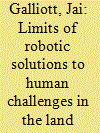| Srl | Item |
| 1 |
ID:
155765


|
|
|
|
|
| Summary/Abstract |
In the face of rapid technological change and the creation of ambitious military modernisation programmes, this paper argues that land forces, in managing the relationship between force levels and the adoption of military robotics, must recognise that there are inherent limits to techno-centric force reduction efforts and realise the inefficacy of substituting skilled soldiers with robots. It begins with an overview of how the proper integration of robotics into a military’s force structure can improve capability, save lives and potentially reduce costs, but suggests that common accounts of robot utility are exaggerated and endanger the risk assessment processes governing the adoption of said technologies and relevant personnel settings. The paper explores the limits of robotic solutions to military problems, discussing their technical limitations, redundancy and related issues that, when combined with a technico-moral skills degradation problem also detailed within, point to the need to reshape force structures to suit the adoption of robotics while preserving existing levels of human staffing.
|
|
|
|
|
|
|
|
|
|
|
|
|
|
|
|
| 2 |
ID:
126313


|
|
|
|
|
| Publication |
2013.
|
| Summary/Abstract |
In wars fought within and ultimately for the support of civilian populations, the gender dimension becomes a vital one. Simply put, the success or failure of a campaign could, in part, hinge on the roughly 50 per cent of the population that is female. Jody M Prescott tackles the issue of gender mainstreaming in NATO, and suggests a comprehensive evolution of doctrine, tactics and personnel policy is needed.
|
|
|
|
|
|
|
|
|
|
|
|
|
|
|
|
| 3 |
ID:
127620


|
|
|
|
|
| Publication |
2013.
|
| Summary/Abstract |
The author analyzes the personnel shifts in 2012 and during the first month of 2013 in the Republic of Kazakhstan to point out that despite the scope (the government, local executive structures, and central state security services received new people), the country's state administration bodies did not undergo any rejuvenation. Furthermore, the personnel shifts in the defense and security structures (the police investigation departments in particular) show that the country's leaders attach particular importance to the processes going on inside the country and want to keep them under control.
Ten regions received new akims (heads of the administrative-territorial units) who, when appointed, were warned about the possible repercussions of embezzlement and misuse of budget money. New instruments of control over what the akims are doing in their regions have been created in the hopes of reducing the still fairly widespread nepotism to a minimum.
There is another interesting side to the personnel shifts of 2012-2013: just as in Russia, the parliament of Kazakhstan is turning into a "waiting room" or "depot" of sorts where deputies either await a new appointment or live out the remaining days of their political career.
The 2012-2013 rotations are described as the first steps toward implementing a new program called the Kazakhstan-2050 Strategy. The political priorities and implementation methods, however, will never change: the president remains in charge of everything up to and including the choice of prime minister.
|
|
|
|
|
|
|
|
|
|
|
|
|
|
|
|